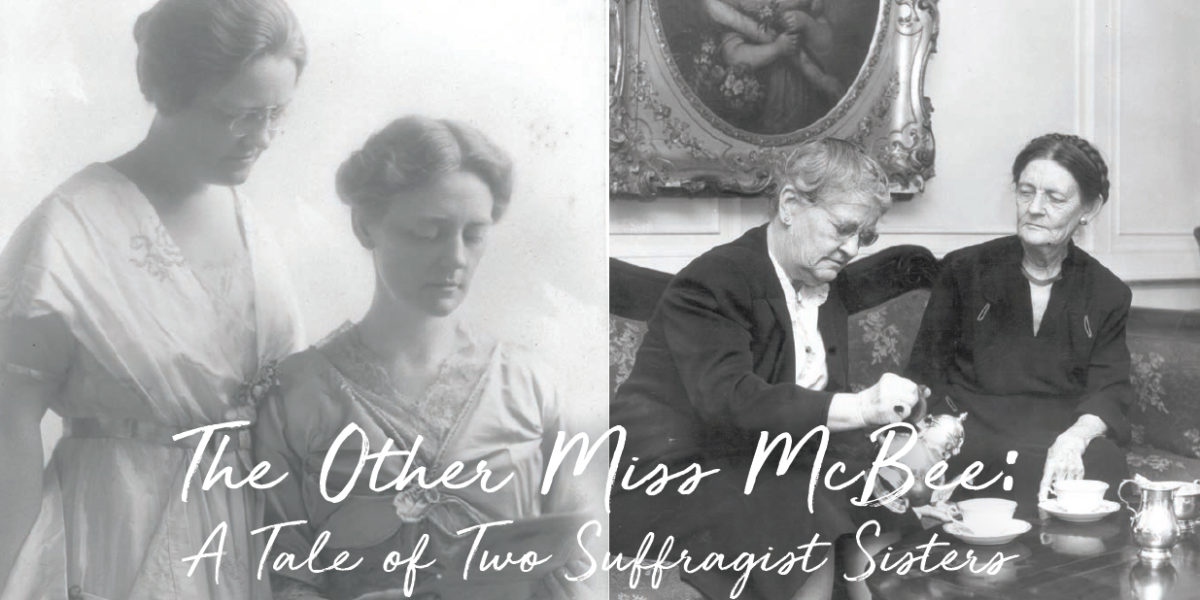
The name looms large in Ashley Hall lore: Miss McBee. She is the founder who, in pursuing her own dream, helped generations of young women to realize dreams of their own. A passionate advocate for girls to receive a quality education and assume their rightful role as leaders, she built her school into an institution that has endured for over a century and has gained a national reputation for excellence. It was her life’s work and her enduring legacy.
She did not do it alone.
One year after Mary Vardrine McBee planted the roots of Ashley Hall, her sister Estelle joined her to support the new endeavor. A year older and a fellow graduate of the Fairmount School for Girls in Tennessee, Emma Estelle McBee had traveled extensively in Europe and worked in community and social services in New York, including a position on the Board at the Jacob Riis Neighborhood Settlement. With a love of the arts, Estelle was an accomplished actress and percussionist, talents that led her to contribute both as a performer and patron to the Dock Street Theatre and the Charleston Symphony Orchestra. At Ashley Hall, she became Vardrine’s assistant and close confidant, wearing many hats and even teaching English, French, the sciences, and first grade before the sisters retired together in 1949.
The School became her life’s work too. Like her sister, Estelle was most passionate about civic engagement and improving the lives of others, especially women. While Vardrine gravitated to educational-based advocacy groups, including becoming the first woman to serve on the Charleston School Board and the president of the Charleston Free Library (which she helped to found), Estelle immersed herself in the work of the first women’s suffrage organizations in South Carolina. In 1914, she was elected vice president of the Charleston Equal Suffrage League, whose mission was “to safeguard and advance the legal, industrial, and educational rights and interests of women to obtain the franchise for women on equal terms with men.” League members held meetings to strategize, wrote letters, distributed literature, made public addresses, and met with local organizations. An important feature of their advocacy was hosting nationally known suffragists, including Alice Paul, Elsie Hill, Inez Milholland, and Abby Scott Baker, some of whom drew crowds so large that the events spilled over into the street.
In 1917, the McBee sisters supported a National Woman’s Party (NWP) Conference on Suffrage, called to elect a statewide committee. Held at the Charleston Hotel, the conference featured Vardrine as one of its keynote speakers; local girls dressed in the suffrage colors of purple, white, and gold served as ushers and sold the weekly Suffragist magazine. With Ashley Hall’s Head of School speaking at the conference, it would not have been surprising if some were Ashley Hall students. Later that same year, Estelle was part of a Charleston Equal Suffrage League group that organized a local branch of the NWP to lend direct support to the national cause. Becoming a member of the League of Women Voters, Estelle remained politically active all her life.
Dedicated to the causes they held most dear, Vardrine and Estelle McBee left their own distinct marks on Charleston. As political activists, civic leaders, and educators, they committed their lives to the empowerment of women. That suffragist spirit has infused Ashley Hall since its early days and is still prominent today.
